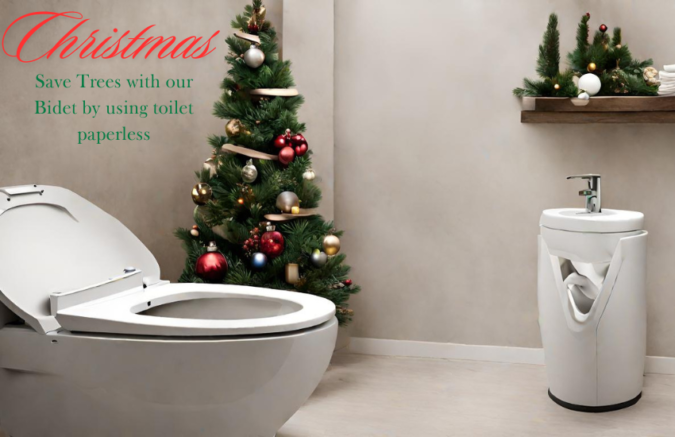Christmas – Save Trees with our Bidet by using toilet paperless: This holiday season brings joy, festivities and a spirit of giving. This year let’s extend that spirit to our planet by considering sustainable practices that can make a meaningful impact.
The Environmental Toll of Toilet Paper
Every year, millions of trees are harvested to produce toilet paper, resulting in deforestation and habitat loss for numerous species. Additionally, the manufacturing process involves significant water and energy consumption, contributing to environmental degradation and carbon emissions.
The Bidet Solution
Bidets offer a sustainable alternative to traditional toilet paper usage. Premium Handheld bidet Sprayer, provide an eco-friendly and hygienic way to cleanse after using the restroom. By using water instead of paper, bidets significantly reduce the amount of toilet paper needed per bathroom visit.
Environmental Benefits of Bidet Usage
- Reduced Paper Consumption:
Bidet usage can substantially decrease toilet paper usage by up to 75% or more, lessening the demand for paper production and conserving trees.
- Water Conservation:
While bidets utilise water for cleansing, the amount used per wash is significantly less than what is required to produce toilet paper. Moreover, advancements in bidet technology have led to water-saving features.
- Decreased Waste Generation:
By cutting down on toilet paper usage, bidets contribute to minimising household waste and alleviating the burden on landfills.
- Mitigation Chemicals Usage
Toilet paper production involves the use of chemicals like chlorine, which can be harmful to the environment. Bidet usage reduces the need for these chemicals, promoting cleaner waterways.
Making a Difference This Christmas
This holiday season, incorporating a bidet into your household can make a meaningful environmental impact. By embracing this eco-friendly alternative, you’re not only reducing your ecological footprint but also contributing to global efforts in preserving forests and conserving natural resources.
Embracing Sustainable Practices
- Spread Awareness:
Encourage friends and family to consider bidet usage and the environmental benefits it offers. Education and awareness play a crucial role in promoting sustainable choices.
- Promote Alternatives:
Showcase the convenience and efficiency of bidets, emphasising their positive impact on the environment. Consider sharing experiences and testimonials to inspire others.
- Conscious Consumption:
Consider gifting a bidet system or spreading the message of sustainability this holiday season. Small changes collectively create a significant impact.
Conclusion: Christmas – Save Trees with our Bidet by using toilet paperless
As we celebrate Christmas and the spirit of giving, let’s extend that generosity to our planet. By adopting bidet usage and reducing toilet paper consumption, we can contribute to a greener, more sustainable future for generations to come. This holiday season, let’s make a conscious choice to save trees and protect our environment with every visit to the restroom.
FAQs:
Yes, bidets are considered hygienic as they use water to clean after using the restroom, providing a thorough and effective cleansing method.
Bidets come in various forms, including handheld sprayers and seat-integrated models, making them adaptable for people of different ages and abilities.
Yes, While bidets greatly reduce the need for toilet paper, some individuals may still use a minimal amount for drying purposes but they use bum towel instead of toilet paper, though this quantity is significantly reduced.
Yes, bidets significantly reduce toilet paper consumption, leading to a decrease in paper production and subsequent environmental benefits such as reduced deforestation and waste generation.
